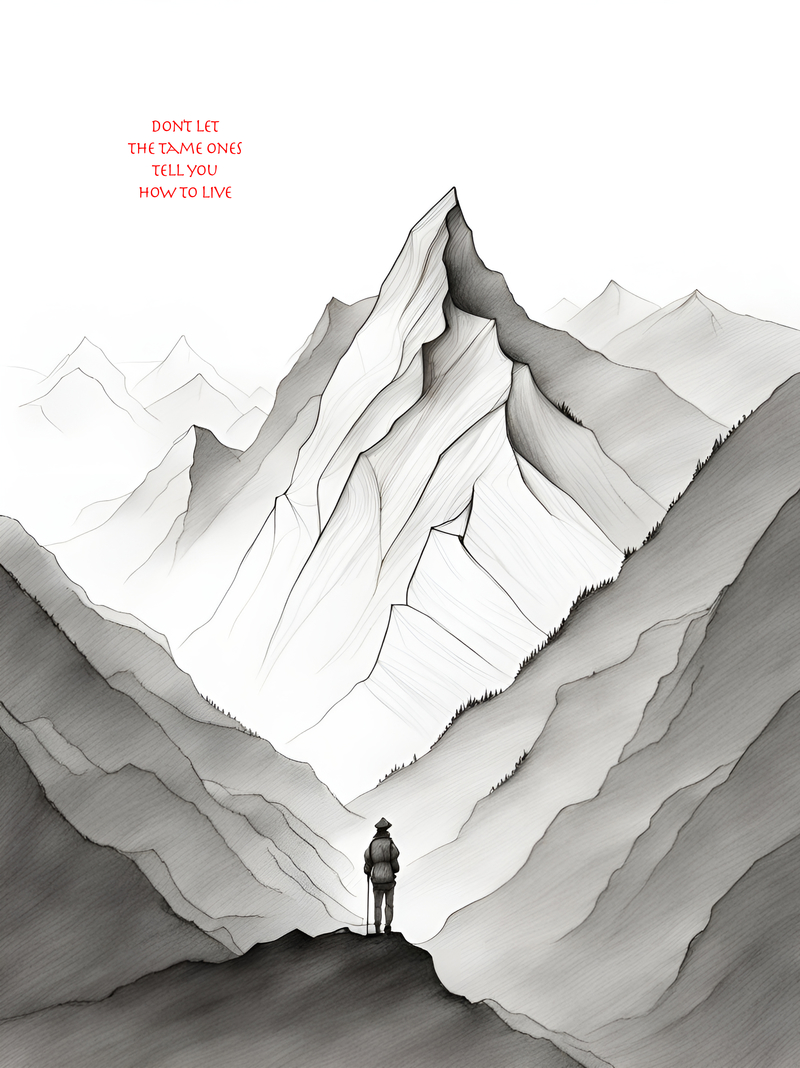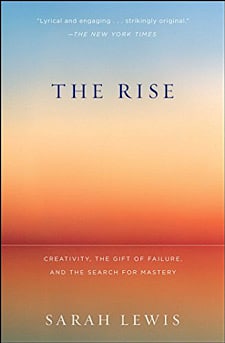Excerpt: The following is an excerpt from The Rise by Sarah Lewis. It is an inspirational story of Julie Moss’s near win in the 1982 Ironman when she lost complete control of her body and how, out of sheer will and determination, she was able to cross the finish line crawling on her knees. It’s a story that will motivate you to push a little harder the next time you go to workout—of that, I’m sure.
Enter Sarah Lewis:
A near win shifts our view of the landscape. It can turn future goals, which we tend to envision at a distance, into more proximate events. We consider temporal distance as we do spatial distance. (Visualize a great day tomorrow and we see it with granular, practical clarity. But picture what a great day in the future might be like, not tomorrow but fifty years from now, and the image will be hazier.) The near win changes our focus to consider how we plan to attain what lies in our sights, but out of reach.
While the thrust of coming close does not always translate into triumph, it can help us outdo ourselves. The story of such a feat by twenty-three-year-old Julie Moss has contributed to the popularity of Ironman competitions. In 1982, she was a college senior at California Polytechnic State University in San Luis Obispo, majoring in Physical Education, and entered the competition in Kona, Hawaii, to collect data on herself for her college major’s requisite senior project. She procrastinated, left the training to the last minute, and prepared during a two-month period before the triathlon and after finals. Her guidance was “limited to one article in Sports illustrated.” So dissimilar was it from anything she had done before, it seemed like fiction. “Fiction gives you the freedom to imagine the impossible and make it up as you go,” she said.
NEW In The Shop: Don’t Let The Tame Ones Tell You How To Live [Poster]
Why We ♥ It: Some of the best advice I (Matt here) ever got was: don’t take life advice from people who aren’t living a life you want to live and don’t take criticism from people you wouldn’t go to for advice. I created this poster to act as a reminder to listen more closely to our role models and less closely to our critics, trolls, and tamed-comfort-zone-hugger acquaintances. It’s also a perfect gift for the outdoor adventurer, travel enthusiast, or solo explorer (or soon to be). Available in print or digital download. 👇🏼
...Want to advertise your book, product, or service? Send inquiries to matt@movemequotes.com.
After the first leg, a 2.4-mile rough-water swim, a 112-mile bike race and the final leg, the 26.2 mile run, she found herself winning at the twenty-fifth mile. She had a six-minute lead. Her closest competitor was a mile behind her. With a half-mile left to win the Ironman, her victory clearly unfurled on the ground before her, Moss began cramping, shifting her gait to a bizarre irregular motion. Within feet of the finish line, her legs gave out. She fell with such unnatural movements on the side of the final stretch that it appeared nearly fatal.
In the footage captured by helicopters and a ground camera from ABC’s Wide World of Sports, she seemed oblivious to the penetrating gazes on her or the attention that such a dramatic scene was casing for the crowd of spectators. She tried to rise and walk, losing control of her body and starfished – her limbs spiraled down on the ground.
At one point when Moss struggled not to lay supine, the footage shows her competitor Kathleen McCartney’s pair of tennis shoes going past. It put Moss in second place. “I thought, ‘That’s her. She’s gone by me’ I just thought, ‘I quit,'” Moss said, narrating what was going through her mind as she did with Jad Abumrad and Robert Krulwich of WNYC’s program Radiolab, and as she had for others before. “And all of a sudden, there’s this voice that just said,” with force this time: “Get up.”
“I thought, ‘I can’t get up again. I’ve sort of worn out that tactic. But I can crawl.’ I don’t know if it was a surge of new-found competitiveness or if I’d just become territorial about my position in the lead, but I didn’t want to come this far and have it taken away from me,” she explained. She lay on the ground, leaning on her arms and legs like a tripod to stagger to a walk and start again.
Moss crawled the last ten yards of the race. She pushed herself to the point of losing control of bodily functions. “I pooped my pants on national TV,” she revealed to Krulwich and Abumrad. This is what was happening as she forced herself to cross the finish line, crawling low to the ground of those Hawaiian lava fields with its banyan trees. “In my mind’s eye, I was making good time. The replay on tape reveals a slower, more truthful version,” she said on another occasion. She shooed off those trying to help her up, not wanting to be disqualified for outside assistance, and even, by accident, her mother Eloise offering her a lei, as she tried to stand to cross the line still running, but she kept falling. A pained creep the only option she had.
NBC’s Jim McKay spoke for the many who have seen it when he called Moss’s finish “the most inspiring sports moment he had ever seen.” The Ironman entrant pool doubled over the following three years.
During that ordeal, she says, “My life was going to be different. I felt my life changing. I made a deal with myself. A deal was struck. And I don’t care if it hurts, I don’t care if it’s messy, I don’t care how it looks, but I would finish. I would finish.
She completed those last ten yards, twenty-nine seconds after McCartney, the competitor who had passed her. It remains the smallest margin of victory for any Ironman competition. Moss still thinks about what it would have been like to win, but credits her near win for leaving her irrevocably changed.
“It was a pivotal moment in my life, that voice that I hadn’t ever called upon that just said, ‘Keep moving forward…”
“That’s the thing that gets me,” Krulwich said. “It didn’t say to you, ‘YOU CAN’T.’ It actually said exactly the opposite,'” reflecting on the fact that Moss was recharged when the mountain was in her sights.
“Isn’t that cool?” Moss said.
Abumrad said, “I would have thought it would have said, ‘Stop. Come on, Stop. Lie down.'”
If you enjoyed this excerpt from The Rise then you might want to check out Sarah Lewis’ book in full. It comes warmly recommended:
Book Overview: It is one of the enduring enigmas of the human experience: many of our most iconic, creative endeavors from Nobel Prize winning discoveries to entrepreneurial inventions and works in the arts are not achievements but conversions, corrections after failed attempts. The Rise explores the inestimable value of often ignored ideas the power of surrender for fortitude, the criticality of play for innovation, the propulsion of the near win on the road to mastery, and the importance of grit and creative practice. From an uncommonly insightful writer, The Rise is a true masterwork.
NEW In The Shop: Don’t Let The Tame Ones Tell You How To Live [Poster]
Why We ♥ It: Some of the best advice I (Matt here) ever got was: don’t take life advice from people who aren’t living a life you want to live and don’t take criticism from people you wouldn’t go to for advice. I created this poster to act as a reminder to listen more closely to our role models and less closely to our critics, trolls, and tamed-comfort-zone-hugger acquaintances. It’s also a perfect gift for the outdoor adventurer, travel enthusiast, or solo explorer (or soon to be). Available in print or digital download. 👇🏼
...Want to advertise your book, product, or service? Send inquiries to matt@movemequotes.com.

Written by Matt Hogan
Founder of MoveMe Quotes. On a mission to help busy people do inner work—for better mental health; for healing; for personal growth. Find me on Twitter / IG / Medium. I also share daily insights here. 🌱
It has taken me 1,000’s of hours to build this free library for you. If it has helped you, you can support my continued effort here. ☕️
![Julie Moss's Inspirational Near-Win in the 1982 Ironman [Excerpt]](https://movemequotes.com/wp-content/uploads/2014/09/IMG_7018-930x620.jpg)

